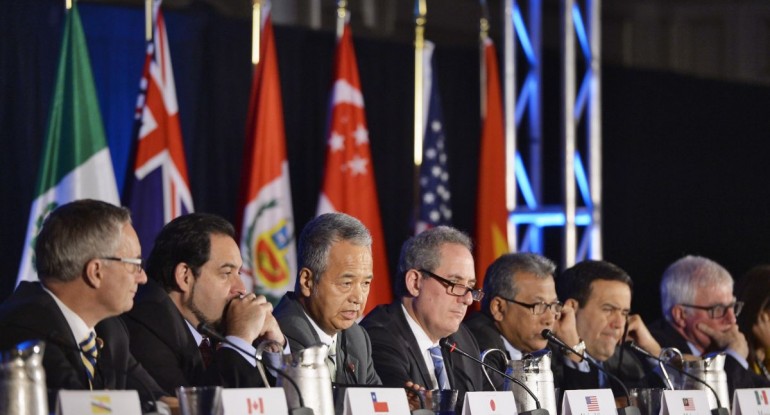Boycott: A Conservative Response to Trade Craziness?
By Mark Ellis
PJMedia.com

When GOP front-runner Donald Trump talks about the loss of American jobs to foreign workers, four companies are held up as prime offenders: Ford, Carrier, Nabisco, and Pfizer. All four are, to one extent or another, shipping living wage manufacturing jobs to countries where labor costs pennies on the outsourced American worker's dollar. Some even coerce (by threatening to withhold severance pay) long-time citizen workers to train the foreigners who are taking their jobs.
Should patriotic conservatives respond by voting for a trade skeptic like Trump, or with concrete steps like a boycott of specific companies?
Nobody likes the B-word, but it’s possible things have gotten so bad when it comes to jobs and trade -- so unfair -- that a boycott is the only way for stateside consumers to signal that they will no longer tolerate companies that ship a significant portion of their manufacturing operations outside the United States. Trump has already taken one symbolic step: he’s stopped buying one of his favorite cookies, Oreos (by Nabisco).
Trump’s rhetoric about these companies definitely resonates as I look around my own house. There’s a Ford Ranger in the garage, the latest in long line of work vehicles. I’ve got a Carrier air conditioner upstairs, and Nabisco Chips Ahoy! cookies in the kitchen cupboard. Pfizer? Not a day goes by when I don’t reach for an Advil or two, especially if it’s Super Tuesday.
Divisions about who should be the Republican standard bearer aside, perhaps the time has come for us to examine anew the actions of companies whose products are on our shelves and in our garages. Trump has rallied a silent majority of voters, of all political persuasions, with warnings about a gutted American economy. It’s possible he is also fomenting a silent boycott mentality among the populace.
As I contemplate options for my next purchase of a work truck, an air conditioner, the scores of cookies I buy annually, and the painkillers always within easy reach, perhaps a little consumer research is in order. In a world of free enterprise choices, why go with a company whose market decisions have the effect of hollowing out the nation’s lifeblood economy?
Free trade, one specific area where Trump’s conservative critics have lampooned the mogul’s claims to conservatism, has been sold to the citizenry as a win-win: more jobs, lower prices. It is obvious in the wake of NAFTA and other trade deals that low prices were indeed part of the bargain. The jobs—at least the living wage jobs—didn’t quite follow; in fact, many if not most of our living wage manufacturing jobs dried up.
Critics of free trade note the trillion dollar trade deficits, and present a counterintuitive response: What good are low prices if disposable income is decimated by a pandemic loss of gainful employment? Citizens have awakened to the failures of a system that consigns millions of potential employees to little more than subsistence-level work, just to keep the price of Mexican-made air conditioners and Made in China plumbing fixtures low, and their makers fabulously wealthy.
Free trade hawks counter that laws and restrictions aimed at combating the expatriation of jobs will be ultimately counterproductive. They insist that tariffs, import taxes and other trade balance mechanisms will exclude the United States from a thriving global economy, and consign us to an isolationist/protectionist malaise.
Factoring Trump’s annual trade deficit numbers—over $550 billion with China, $75 billion with Japan, and $58 billion with Mexico—one might extrapolate that the malaise is already upon us. The numbers are already stacked against American-made products and the stateside labor market. It’s understandable that unemployed or underemployed workers and families would favor the enactment of stringent policies aimed at forcing foreign governments into more reciprocal trade deals.
Fundamental to Trump’s campaign is the promise of “smart trade.” He vows to bring down the curtain on what he characterizes as inept, unbelievable, and “crazy” trade policy, entered into not by skilled negotiators and deal-makers, but by political hacks. He’s not letting the all-talk-no-action politicians off the hook, but he’s also naming the names of American corporations. If elected, after systematically rooting out the government class that has facilitated our sad state of economic affairs, he will justifiably call out companies that leave the country and deprive America of its manufacturing base, sovereign capital, and economic health.
Strong support of free trade is codified as an essential position for true conservatives. This election cycle, a candidate's position on trade policy has become something of a conceptual third rail. Donald Trump hasn’t just touched that rail; he’s pulled it up by the spikes and twisted it into a pretzel.
When my Ranger stops rolling, should my answer to Ford's assembly plant relocation to Mexico be a Chevy? When my Carrier breathes its last, cookies are on the menu, and two Advils are indicated after channel surfing through another Super Tuesday election night, should it be Trane, Keebler, and two Tylenol’s from Johnson & Johnson?

